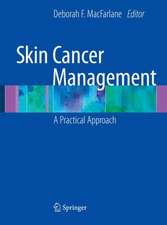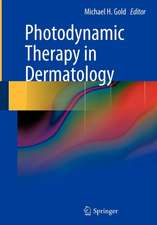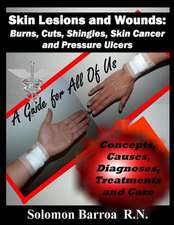Advances in Transplant Dermatology: Clinical and Practical Implications
Editat de Fiona Zwald, Marc D. Brownen Limba Engleză Hardback – 29 ian 2015
Preț: 705.64 lei
Preț vechi: 742.78 lei
-5% Nou
Puncte Express: 1058
Preț estimativ în valută:
135.04€ • 140.69$ • 112.28£
135.04€ • 140.69$ • 112.28£
Carte disponibilă
Livrare economică 18 ianuarie-01 februarie 25
Preluare comenzi: 021 569.72.76
Specificații
ISBN-13: 9783319124445
ISBN-10: 3319124447
Pagini: 117
Ilustrații: XIV, 117 p. 17 illus., 15 illus. in color.
Dimensiuni: 178 x 254 x 14 mm
Greutate: 0.47 kg
Ediția:2015
Editura: Springer International Publishing
Colecția Springer
Locul publicării:Cham, Switzerland
ISBN-10: 3319124447
Pagini: 117
Ilustrații: XIV, 117 p. 17 illus., 15 illus. in color.
Dimensiuni: 178 x 254 x 14 mm
Greutate: 0.47 kg
Ediția:2015
Editura: Springer International Publishing
Colecția Springer
Locul publicării:Cham, Switzerland
Public țintă
Professional/practitionerCuprins
Transplantation today.- De novo malignancies after solid organ transplantation: focus on viral infection.- Update on benign and inflammatory skin disease secondary to transplant medication.- Update on photoprotection and sunscreen use in solid organ transplant recipients.- Update on our understanding of HPV as a risk factor for cutaneous SCC in organ transplant recipients.- Advances in our understanding of immunosuppression as a risk factor for cutaneous SCC: evidence for revision of immunosuppressive therapy.- Advances in photodynamic therapy for the treatment of malignant and pre-malignant lesions in transplant dermatology.- Update on staging, definition and chemoprevention of ‘high risk SCC’ in organ transplant recipients.- Advances in management of ‘high risk SCC’ in organ transplant recipients.- Advances in management of Merkel cell carcinoma in organ transplant recipients; role of polyoma virus and immunosuppression.- Update in melanoma in organ transplant recipients.- Update on unusual tumors in organ transplant recipients.
Notă biografică
Fiona O’Reilly Zwald, formerly Assistant Professor in the Department of Dermatology and Division of Transplantation at Emory University School of Medicine, Atlanta, Georgia, received her MD at the Royal College of Physicians and Surgeons of Ireland, in 1990 and achieved MRCPI (Member of the Royal College of Physicians of Ireland) status in 1993. Dr Zwald is a Diplomate of the American Board of Dermatology and the National Board of Medical Examiners, a Fellow of the American Academy of Dermatology, the American College of Mohs Surgery and the American Society for Dermatologic Surgery.
Since 2009 Dr. Zwald has been an active member of the Executive Board of Directors of the International Transplant Skin Cancer Collaborative, and is currently President (2014-2016) of this organization. She is an active board member of the American College of Mohs Surgery (2014-2017) having served as Chair of the Scientific Committee in 2014. From 2011-2014 she served as a member of the Steering Committee for Procedural Dermatology, of the Association of Professors of Dermatology. Dr.Zwald is a member of the editorial boards of Clinical and Experimental Dermatology, the American Journal of Transplantation, and the Archives of Dermatology.
Dr Zwald is in private practice in Atlanta where continues her work with the organ transplant population. Her research focus is targeted towards early detection and management of aggressive skin cancer in the high-risk solid organ transplant and otherwise immunosuppressed population.
Marc D. Brown, MD, is Professor of Dermatology and Oncology, University of Rochester, School of Medicine and Dentistry, Rochester, New York. Since 1993 he has been Director of the Division of Dermatologic Surgery, Oncology, and Mohs Surgery at Strong Memorial Hospital, Rochester, New York. He is also Director ofthe Multidisciplinary Melanoma Practice at the Wilmot Cancer Center. Dr. Brown is a Diplomate of the American Board of Dermatology and a Fellow of the American Academy of Dermatology, the American College of Mohs Surgery, and the American Society for Dermatologic Surgery. He is a past President of the Association of Academic Dermatologic Surgeons, the International Transplant Skin Cancer Collaborative, and the American College of Mohs Surgery. He is currently on the Board of Directors of the American Society of Dermatologic Surgery and recently elected to the Board of Directors of the American Academy of Dermatology. Dr. Brown was cited in America’s Top Doctors. He is a member of the editorial board of Dermatologic Surgery and has published over 50 peer reviewed articles; he is co-author of the Manual of Skin Surgery, the second edition of which appeared in 2011 (People’s Medical Publishing House).
Since 2009 Dr. Zwald has been an active member of the Executive Board of Directors of the International Transplant Skin Cancer Collaborative, and is currently President (2014-2016) of this organization. She is an active board member of the American College of Mohs Surgery (2014-2017) having served as Chair of the Scientific Committee in 2014. From 2011-2014 she served as a member of the Steering Committee for Procedural Dermatology, of the Association of Professors of Dermatology. Dr.Zwald is a member of the editorial boards of Clinical and Experimental Dermatology, the American Journal of Transplantation, and the Archives of Dermatology.
Dr Zwald is in private practice in Atlanta where continues her work with the organ transplant population. Her research focus is targeted towards early detection and management of aggressive skin cancer in the high-risk solid organ transplant and otherwise immunosuppressed population.
Marc D. Brown, MD, is Professor of Dermatology and Oncology, University of Rochester, School of Medicine and Dentistry, Rochester, New York. Since 1993 he has been Director of the Division of Dermatologic Surgery, Oncology, and Mohs Surgery at Strong Memorial Hospital, Rochester, New York. He is also Director ofthe Multidisciplinary Melanoma Practice at the Wilmot Cancer Center. Dr. Brown is a Diplomate of the American Board of Dermatology and a Fellow of the American Academy of Dermatology, the American College of Mohs Surgery, and the American Society for Dermatologic Surgery. He is a past President of the Association of Academic Dermatologic Surgeons, the International Transplant Skin Cancer Collaborative, and the American College of Mohs Surgery. He is currently on the Board of Directors of the American Society of Dermatologic Surgery and recently elected to the Board of Directors of the American Academy of Dermatology. Dr. Brown was cited in America’s Top Doctors. He is a member of the editorial board of Dermatologic Surgery and has published over 50 peer reviewed articles; he is co-author of the Manual of Skin Surgery, the second edition of which appeared in 2011 (People’s Medical Publishing House).
Textul de pe ultima copertă
This book provides an informative update on scientific advances relating to transplant dermatology that may be applicable to clinical practice. Commentary is provided on the emerging role of viruses in transplant dermatology, the management of skin disease secondary to transplant medication, sunscreen use in transplant recipients, the role of revision of immunosuppression, and advances in photodynamic therapy. The latest staging and management criteria for high-risk squamous cell carcinoma and the implications for clinical practice are then analyzed. Finally, the management of other cutaneous malignancies is discussed, covering malignant melanoma, Merkel cell carcinoma, and rarer tumors that also behave aggressively and require special consideration in solid organ transplant patients. Each particular advance is addressed in an individual chapter by leaders in the field. The book both expands current knowledge and complements previous textbooks on the subject.
Caracteristici
Discusses scientific advances relating to transplant dermatology that may impact on clinical practice Examines the management of various cutaneous malignancies in solid organ transplant patients Written by recognized leaders in the field






















